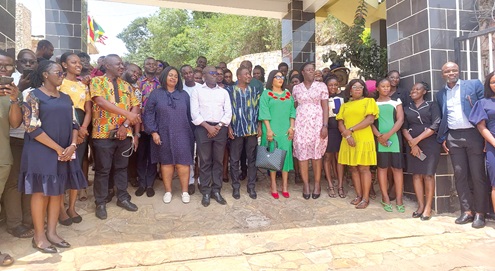
Anti-LGBTQ law may impact HIV-AIDS inroads — Aids Commission
The Ghana AIDS Commission (GAC) says Ghana risks the possibility of HIV and AIDS rebound or increase in infection if the Human Sexual Rights and Family Values Bill, 2021, popularly referred to as LGBTQ+ bill, is passed into law.
Advertisement
It explained that from the public health angle, which included HIV and AIDS, it was likely that the people who would be affected by the law, particularly key populations, would go underground, hide from or refuse to access the needed HIV services including their medication, for fear that they would be criminalised or discriminated against.
The Director, Technical Services of GAC, Dr Fred Nana Poku, said without the persons living with HIV taking their medication, they would have high viral load which could possibly see a hike in new infections, especially when they continued to have sexual encounter without protection.
“That is the possibility using the public health lens to look at the issue. The bill, as it is, has several components.
There are some positive parts and there are some negative parts and that is why in our projections to Parliament, we highlighted the areas that should be looked at.”
“I do not know whether our projections and suggestions and recommendations have been fully captured in the final bill.”
Dr Poku was speaking at a two-day national media training for journalists across the country on HIV-related human rights, stigma and discrimination, organised by the GAC, in partnership with the Ghana Journalists Association (GJA), SEND Ghana and UNAIDS with funding from PEPFAR.
The bill
Parliament, on February 28, passed the Human Sexual Rights and Family Values Bill, 2021.
It imposes three years minimum and five years maximum jail term on those who engage in and promote homosexual activities in the country.
Key populations in HIV and AIDS include female sex workers, men who have sex with men, and transgender individuals.
HIV funding
Earlier in his presentation, the Deputy Director, Programmes, at the GAC, Derick Oppong-Agyare, said the country's quest to end AIDS by 2030 could not be achieved if stigma was high.
"We are not fighting with Parliament," he pleaded, "What we are saying is that Ghana has a target.
We are currently suffering as a country because money for HIV prevention is lacking," he pointed out.
He disclosed that the country spent between $45 to 50 million on medications for PLHIV and that money, he explained, was not from the Government of Ghana but from international partners.
The USAID Ghana Health Office Director, Zohra Balsara, said it was unfortunate that PLHIV continued to experience verbal, psychological and physical abuse in their homes, communities, workplaces and in healthcare settings.
She said as a result of this, people who tested positive for HIV were often afraid to declare their status, pointing out that eliminating stigma and discrimination against PLHIV enabled and encouraged such people to access treatment opportunities for a long and healthy life.
The Organising Secretary of the GJA, Dominic Hlordzie, said discrimination and stigma would not end if journalists sent the wrong message to people in their reportage.
He said in their reportage on HIV and AIDS, media personnel should aim to reduce stigma and discrimination, provide accurate reportage, protect the privacy and confidentiality of PLHIV and be sensitive.




